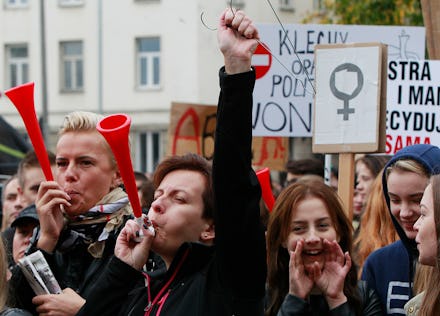Poland makes emergency contraception a prescription-only drug — even for rape survivors

Polish President Andrzej Duda has approved a law that women's rights advocates expect to prove disastrous for rape victims.
Starting in August, emergency contraception will be available only with a doctor's prescription. That's a tall order when one considers that EllaOne (a European equivalent of Plan B) must be taken within five days of unprotected sex — the sooner, the better.
"If emergency contraception is available on prescription only, it’s no longer emergency," Krystyna Kacpura of the Federation for Women and Family Planning told Politico in May, as the Polish Parliament prepared to vote on the measure put forth by the Law and Justice party, or PiS.
According to the Telegraph, Polish law used to allow anyone over the age of 15 to purchase emergency contraception over the counter. Once E.C. becomes a prescription drug, it will be harder to get for those who don't live within the vicinity of a freely available doctor, or those who can't afford to see a doctor.
When it comes to people who've been forced into nonconsensual sex, putting a time limit on access to E.C. is especially harsh, according to Amnesty International. In a statement, the group's researcher on Western Europe and Women's Rights, Anna B?u?, called the law "catastrophic."
While Poland's rate of reported rapes is among the lowest in Europe, as Reuters reported, that may be because authorities tend to dismiss rape allegations without investigations. It may also have something to do with a lack of popular awareness about the pervasiveness of violence against women, according to Reuters — stigma still plagues rape survivors and may prevent them from coming forward in the first place. They may also fear future abuse, all of which helps explain why requiring victims to seek and pay for immediate medical attention is particularly burdensome.
The limitation is perhaps unsurprising in the broader context of Poland's reproductive politics: PiS is targeting the "morning after pill" because the religiously inclined group considers E.C. akin to abortion. It's not — E.C. prevents pregnancy from happening in the first place — but in Poland, abortion is a hotly contested concept.
In October, Polish parliament considered a near-total ban on abortion; whereas abortion is currently legal in Poland only when a pregnancy results from rape or incest, or when it threatens the mother's life or health, politicians wanted to strike rape and incest from the limited list of exceptions. Mass protests kept them from doing so.
Natalia Jakacka, a women’s rights activist and Warsaw-based doctor, told Politico that the country could only expect to see more abortions as the result of the E.C. restriction. Because Polish doctors can opt out of providing reproductive care under the country's "conscience clause," she said, women aren't guaranteed prescriptions even if they can get a timely appointment.
"There will be a greater number of illegal and dangerous abortions," she explained, "Which is dangerous to women’s health and lives and carries social and economical costs."